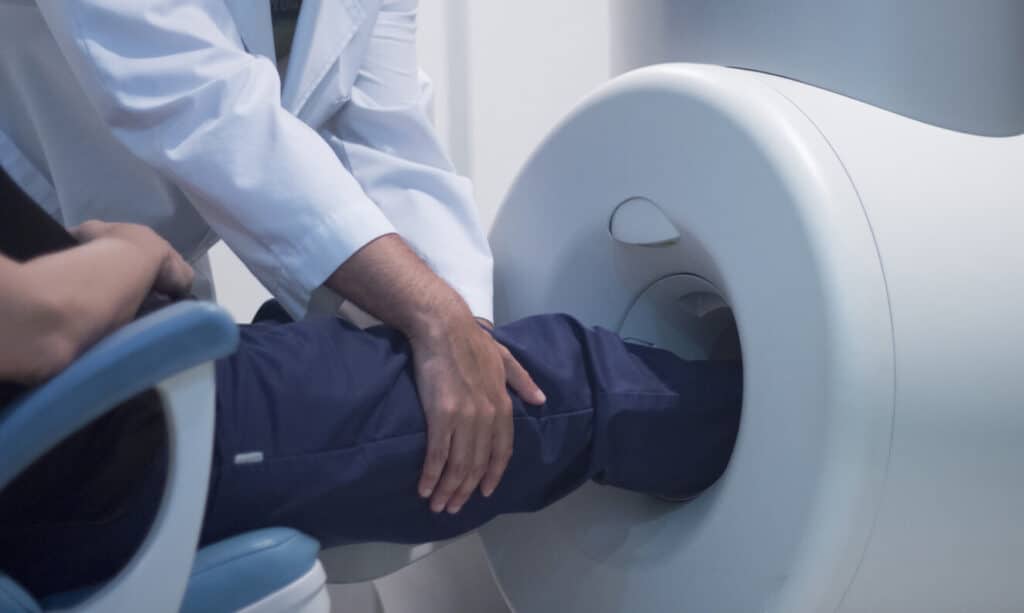
Knee replacement surgeries have transformed the lives of millions, offering relief from chronic knee pain and improved mobility. However, like any major medical procedure, there are instances where a knee replacement may need to be revisited or revised. This is where the role of precise diagnostics becomes crucial.
Let’s explore the various diagnostic techniques used in knee replacement revisions, such as imaging and clinical assessments.
Understanding Knee Replacement Revision
Knee replacement surgeries are a common solution for chronic knee problems. However, a revision or a second surgery is sometimes necessary. The accuracy of diagnostic techniques is crucial in these cases.
Revision surgery is often more complex than the initial replacement. It’s vital to understand the reasons behind the need for knee replacement revision and the challenges in diagnosing the precise issue.
Diagnostic Techniques for Knee Replacement Revision
In the realm of knee replacement revisions, the accuracy and depth of diagnostic techniques are paramount. These diagnostics not only identify the need for revision but also guide the surgical approach.
Let’s delve deeper into these critical techniques.
X-ray
This is the most fundamental imaging technique used in diagnosing issues with a knee replacement.
X-rays provide clear images of bone structure and alignment, allowing doctors to see if there are any issues with the placement or wear of the prosthetic components. They can reveal:
- Loosening
- Misalignment
- Wear and tear of the prosthesis
Magnetic Resonance Imaging (MRI)
While X-rays are excellent for viewing bone, MRIs are more adept at visualizing soft tissues, including ligaments, tendons, and muscles.
This is crucial in assessing the condition of the soft tissue structures around the knee joint, which might be contributing to pain or dysfunction.
Computed Tomography (CT) Scan
A CT scan provides a more detailed view than an X-ray and is particularly useful in complex cases. It offers a three-dimensional image, giving surgeons a comprehensive view of the knee structure.
This is particularly helpful in planning revision surgeries, as it can reveal issues not apparent on X-rays or MRIs.
Physical Examination
The first and most direct approach is a thorough physical examination of the knee. This includes assessing:
- Range of motion
- Stability
- Alignment
- Swelling or tenderness
Patient History
A detailed patient history is vital. Understanding the patient’s symptoms, activities that aggravate or relieve pain, previous knee injuries or surgeries, and overall health history provides context to the current condition.
Laboratory Tests
These tests are particularly important when an infection is suspected. Elevated levels of certain markers in the blood can indicate an infection around the knee prosthesis.
Fluid can also be drawn from the knee joint and analyzed for signs of infection.
Each of these diagnostic tools offers unique insights and when combined, they provide a comprehensive understanding of the challenges faced in a knee replacement revision.
Accurate diagnosis is the cornerstone of successful treatment, ensuring that each patient receives the most appropriate and effective care for their specific condition.
Preparing for a Knee Replacement Revision Surgery
A clear understanding of the surgery, including risks and expected outcomes, helps reduce anxiety before the surgery. Patients should also be aware of the recovery process and timelines, as revision surgeries may have longer recovery periods.
Preparing for a revision knee replacement surgery involves several key steps for both the patient and the healthcare providers:
Physical Preparation
- Pre-Surgical Assessments: Patients undergo essential health assessments to ensure they’re fit for surgery.
- Physical Therapy: Pre-surgery exercises to strengthen knee muscles can aid in faster recovery.
- Medication Management: Review and adjust medications with the surgeon, especially those affecting blood clotting.
Logistical Planning
- Post-Surgery Care: Arranging for caregiving, meal preparation, and home modifications is crucial for a comfortable recovery.
- Transportation and Accommodation: Ensuring easy transport and a comfortable recovery space is important.
Healthcare Provider’s Role
Your healthcare provider is also central to your overall preparation. Surgeons should provide a clear plan of the surgery and the techniques to be used.
Also, a comprehensive care plan, including pain management and physical therapy, is crucial.
The combined efforts in preparing for a revision knee replacement surgery aim to optimize the outcome and ensure a smooth recovery process.
It involves comprehensive planning and readiness, encompassing not only the physical aspects but also the mental and logistical preparations.
Knee Replacement Revision Specialist Near You in Boynton Beach, FL
If you are in search of the best knee replacement revision specialist near you in Boynton Beach, you can rely on the trusted healthcare providers at Personalized Orthopedics of the Palm Beaches. Our surgeons are all board-certified and fellowship-trained. As our name implies, we will personalize our approach to your specific needs to ensure you receive excellent care.
To know more about our services or to schedule a consultation with one of our providers, call us today at (561) 733-5888 or fill out our online appointment request form.
We look forward to serving you!

